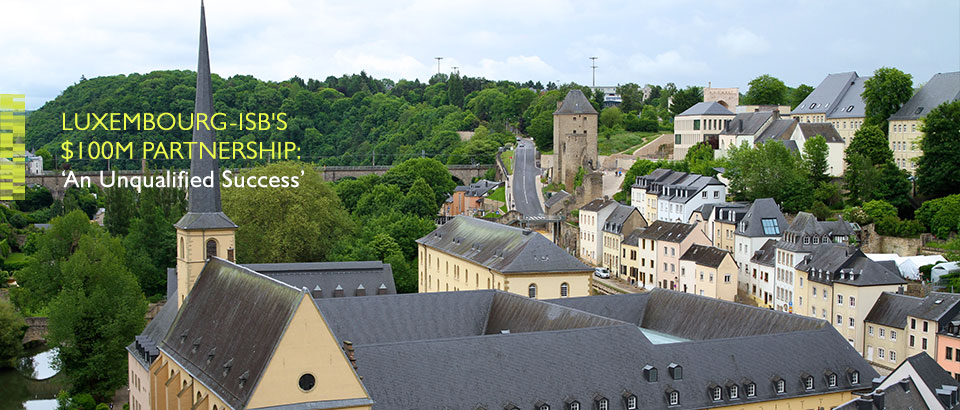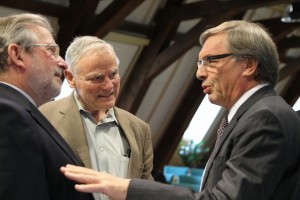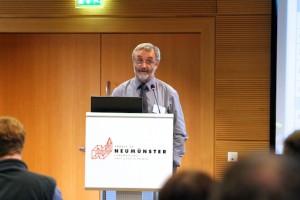Luxembourg-ISB Partnership: ‘An Unqualified Success’
 isbscience.org/news/2013/06/12/luxembourg-isb-partnership-an-unqualified-success/
isbscience.org/news/2013/06/12/luxembourg-isb-partnership-an-unqualified-success/
LUXEMBOURG JOURNAL, June 12, 2013 – At the 17th-century Neumünster Abbey, the cultural heart of Luxembourg City, a small group of some of the world’s most cutting-edge scientists gathered on June 10-11, 2013, for a symposium to discuss the future of medicine and healthcare. The consensus was clear: Achieving the greatest advances requires “no-box” thinking, cross-disciplinary teamwork and, as ISB president, Dr. Lee Hood, likes to say, determined optimism.

Neumunster Abbey in Luxembourg is a cultural events center and where the LCSB-ISB symposium was held on June 10-11, 2013. For a full gallery of images from Luxembourg, click on the photo.
It was this commingling of drivers that birthed an unprecedented strategic partnership between ISB and the Grand Duchy of Luxembourg and which led to this symposium to highlight the achievements that have resulted from the $100 million that was invested over the program’s five years (2008-2013).
Luxembourg is a small European country of half a million citizens with an economy based heavily in the financial sector. Recognizing its need to diversify in order to achieve long-term economic stability, Luxembourg developed the Health Sciences and Technologies Action Plan in 2007, which set into motion the nation’s aspiration to become Europe’s biotech hub. But with no history or foundation in life sciences research, Luxembourg was at an acute disadvantage.
“It was clear we needed partners to strengthen our research base and allow us to leap frog to close the gap,” said Jeannot Krecké, who is the former Luxembourg Minister of the Economy and Foreign Trade who helped spearhead the strategic partnership with ISB. “On our own, it would’ve taken years if not decades to get the visibility and, above all, the credibility.”

Jeannot Krecke, right, shares a moment with Dr. Lee Hood, center, and Luxembourg Minister of Health, Mars Di Bartolomeo.
There were three main components to the strategic partnership: ISB would work with the University of Luxembourg to establish the Luxembourg Centre for Systems Biomedicine (LCSB). ISB would fuel a large research effort that, as LCSB matured, would serve as the foundation for additional scientific collaborations. And, ISB would, in an innovative way, bring biotech to Luxembourg.
To these points, ISB helped to recruit Dr. Rudi Balling as the director of LCSB and additional scientific staff. Through a fellowship program, ISB provided training to LCSB staff at its labs in Seattle to learn about systems biology and systems medicine, as well as developing new technologies. Research collaborations have resulted in the co-authorship of 22 journal publications that cover subjects including systems genetics, human metabolism, family genome sequencing, proteomics, using blood biomarkers in diagnostics.
As for helping Luxembourg kick-start its biotech industry, ISB has facilitated connections with U.S. companies that are interested in establishing a European base. As well, ISB has spearheaded collaborations with LCSB that include European Molecular Biology Laboratory; University of California, San Diego; Utah State; McLaughlin Research Institute; Gladstone Institutes, and others. Most significantly, ISB and LCSB created Integrated Diagnostics, a spin-out company focused on creating diagnostics using blood protein biomarkers.
“This has been one of the most interesting experiments in scientific collaborations in my career,” Hood commented. “I think the Luxembourg Centre for Systems Biomedicine is an unqualified success and I think Rudi Balling’s leadership has played a key role in that.”
Balling, an impassioned leader and speaker, expressed that while the partnership was a risky endeavor, it paid off and was an opportunity that could not be denied.
“Once you make a decision, you cannot wait,” Balling said. “I’m absolutely convinced that if I had waited (for all the pieces to be in place), we would not be here today.”

Rudi Balling, Director of Luxembourg Centre for Systems Biomedicine, delivers a talk about the state of the institute.
LCSB is poised to lead Luxembourg’s nascent research sector to become a hub for studies on neurodegeneration and eventually to develop expertise in translational medicine. Systems biology and systems medicine, Balling explained, are essential to success. “For this, you need to understand the mechanisms (of disease). The times of trial and error are over in biology.”
Patrizia Luchetta, the Director of Life Sciences and Technology in Luxembourg’s Ministry of the Economy, echoed the sentiment that doing anything worthwhile is worth taking risks. She recounted how a colleague warned her that if this partnership failed, it would plague the rest of her political career. Her response: “You can only fail if you do something. And not only have we not failed, but we have scored a triumph. Now we have to transform it to make sure it becomes sustainable.”
For Hood, having national and international scientific partnerships is imperative to solving the biggest and most complex health problems. During his talk at the symposium, he mentioned being inspired by Thomas Friedman’s book “The World is Flat” on how globalization was flattening borders, making geography irrelevant. You don’t need to be located in a given place and Hood decided he wanted to flatten the world of science.
“At heart, we’re missionaries,” Hood said. “We think we’ve done something at ISB very well and we think we can export that around the world and have it done effectively elsewhere. International partnerships are a key aspect to this.”
Learn more about strategic partnerships with ISB. Visit the photo gallery for the LCSB-ISB symposium.





